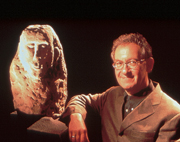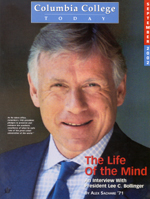 |
 |
 |
 |
|
AROUND THE QUADS
How about: An international champion whistler. The creator of a humanitarian program that has been accepted as an international outreach campaign by the United Nations. A professional Irish step dancer. A resident of 15 cities who has attended 17 schools. An accomplished violinist who founded her own musical group. A Life Master bridge expert who helped the United States win the World Youth Team Championship last year. Want more? The founder/editor of The U.S. Music Vault online (and one of YM Magazine’s “11 Coolest Boys in America”). A speech All-American who led his school to state Constitutional Scholar honors and second place nationally. A nationally ranked rock climber. Harrison Ford’s daughter, or rather, the actress who played her in Air Force One. A double gold medalist in the National Russian Language competition. The creator of a teens facing anorexia program whose template is used in textbooks and internationally. We could go on (and on), but by now you’ve probably gotten the point. The 1,044 members of the Class of 2006, culled from a record 14,137 applicants, needed more than good grades and top board scores to catch the eye of Director of Undergraduate Admissions Eric Furda, his staff and the many volunteer interviewers serving on the Alumni Representative Committee. Which is not to say the academic credentials weren’t there — the average combined SAT score of accepted students was 1,430, the highest in College history.
Helfand is the chair of the astronomy department and has been a member of the Columbia faculty since 1977. His approach is to help students to wonder about the world and to literally “reach to the stars.” If you walk into his class, you might find him standing on top of the desk and twirling around on a disc as part of a demonstration on how a law of physics actually functions in the universe. Helfand’s ability to combine his background in drama with his passion for the wonders of science and his deep commitment to the art of teaching is just one of the many qualities that distinguish him as a great teacher. At the same time that he can bring drama and excitement into the classroom, he takes students and teaching as a whole seriously. This is evident in the thorough approach he brings to reviewing the records and achievements of students who have been recommended for academic honors and/or who have applied for selected fellowships. Ateshian received his Ph.D. in mechanical engineering from Columbia in 1991 and received an appointment as an assistant professor shortly thereafter. He received tenure in 1998 and was promoted to full professor earlier this year. He played a major role in the 1999 creation of the Department of Biomedical Engineering and has served as its vice chair since. His area of expertise is orthopedic biomechanics, which is the study of the lubrication and tribology of natural joints. He has become a recognized authority on joint lubrication and cartilage biomechanics and how these are affected by aging and disease. For further information about the dinner, please contact Dr. Alexandra Baranetsky at (973) 376-2212 or ab665@columbia.edu.
The development staff, led by Executive Director of Alumni Affairs Derek Wittner ’65 and College Fund Director Susan Levin Birnbaum, worked in conjunction with the Fund Committee, led by outgoing Fund Chair Edward Weinstein ’57. Vice chairs included Robert Berne ’60, new fund chair Geoff Colvin ’74, Abby Black Elbaum ’92, Robert Fischbein ’60, Conrad Lung ’72, Laurence Rubenstein ’60 and Steve Schwartz ’70. Highlights of the year included record participation by the Class of 2002, with more than 50 percent of graduating seniors choosing to support the College Fund, compared with 30 percent last year. Young alumni giving, chaired by Elbaum and staffed by Young Alumni Fund Director Preeti Davidson ’00 Barnard, continued to increase participation, with the Class of ’92 leading the young alumni classes. The Parents Fund, chaired by Karen and John Lyle P’02 ’03 and staffed by Director Susan Rautenberg, grew by 48 percent to $665,000, as compared with last year’s $448,000. Gifts to the Columbia College Fund allow Dean Austin Quigley and his staff to pursue initiatives to improve services and resources offered to College students. Unrestricted gifts are those that give the dean the most flexibility to use where he sees the need, providing current and immediately usable funds for the College’s many programs, including financial aid and student services.
“There is a yawning gulf between the various visions of what a modern school of journalism ought to be, and it is unwise for the University to expect a new dean to lead us out of this conflict and into a new direction,” said Bollinger in an e-mail sent on July 23 to students, faculty and staff of the J-School. “We live in an age in which the system of communications is widely understood to be undergoing revolutionary changes and, at the same time, is the critical element in forging democracies, markets, culture and the phenomenon of globalization. To teach the craft of journalism is a worthy goal, but clearly insufficient in this new world and within the setting of a great university.” The University will convene a task force composed of faculty and administrators to discuss the traditions of what is widely regarded as the nation’s premier journalism school and to examine where j-school education is going and how it might evolve. The task force will report its findings before the end of the fall semester. David Klatell, a professor of broadcast journalism who has been the academic dean of the Journalism School since 1999, has been named acting dean. “The question,” Klatell told The New York Times, “is what do we need to do to train someone to be a good journalist? What Bollinger’s talking about is an expansion of what we do. All the craft elements would remain.” In a letter to alumni of the J-School, Klatell expounded on that theme. “Everything we do will be in the service of journalism,” he wrote. “To act otherwise would contravene the bedrock principles upon which the school was built. I can assure you that writing, reporting, interviewing and editing will remain the pillars of our program.”
Conrad Lung ’72, president of Sunnex and the recipient of a John Jay Award for Distinguished Professional Achievement earlier this year, has pledged a matching gift of $25,000 per year to the fund. Lung, who has been active in alumni affairs and served as president of ACAA at its inception, is the first Asian-American to receive a John Jay Award. President Lee Bollinger will be the keynote speaker at the
fund-raising dinner, and Dr. Clyde Wu, a University trustee who has
been active in forging collaborations between P&S and leading
medical schools in Hong Kong, Shanghai and Beijing, will be the
special honoree. For further information, please contact Chester
Lee at chester.lee@aig.com |
|
|||||||||||||||||||||||||||||||||||||||||||||

